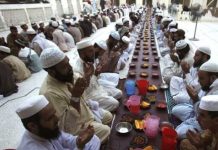RAWALPINDI, OCT 14 /DNA/ – On the eve of International Rural Women’s Day, celebrated globally on 15 October, rural women leaders in 70 districts across Pakistan today demanded the government should officially recognize 15 October as a National Day for Rural Women like other countries, and celebrate it annually at the national level. Speaking from the platform of Rural Women Alliance, facilitated by Potohar Organization for Development Advocacy (PODA), the rural women representatives in each district made these demands addressed issues of women’s rights, development, and gender equality, urging the attention of the government, judiciary, political leaders, and industrialists so that 50 percent women population can prosper. These 15 demands, reflecting the concerns and suggestions of over 150 rural women representatives, were formulated after a series of consultations held across 70 districts. They presented the following charter of demands:
1. Rural Women of Pakistan call for greater political participation, emphasizing the need to enhance women’s representation in district-level decision-making bodies such as Musalhati dispute resolution committees, District Peace Committees, District Voter Education Committee and other forums. They stressed the importance of making these bodies fully functional and operational.
2. Rural Women demand equal representation in Local Governments System and demanded that the Local Bodies system should be made functional in all the provinces and the Local Government elections should be immediately held in Punjab province.
3. To combat the rising Gender-Based Violence (GBV) against women and children, the rural women leaders recommended community awareness campaigns, enactment and implementation of domestic violence prevention laws and anti-rape laws, awareness of Union Council officials and set up of more shelter homes for survivors of violence.
4. On economic empowerment, the rural women leaders demanded formal recognition of rural women working in agriculture as Farmers, on par with men so that their work can be recognized and counted as labour and this would help to increase the number of working women in Pakistan that is often presented in lower numbers even though more women work in agriculture sector than men. They demanded equal access for women for agricultural schemes, easy loans, subsidies and allocation of land for landless workers.
5. Land ownership rights of women and their participation in land transfer process should be ensured timely and women should also be hired as officials (Patwaris and Gardawars) should be hired at Land Record and Revenue departments. The process for registration of women agricultural workers’ unions under the Sindh Women Agriculture Workers Act 2019 should be simplified and such laws should be made in other provinces as well.
6. The rural women leaders demanded setting up district-level business support centers for skilled women to market their products and access to loans on easy terms and training for on-line businesses and demanded special markets for women businesses in every district.
7. Addressing climate change, the women urged government and NGOs to consult rural women on climate adaptation strategies and involve them in tree plantation drives. They stressed their suggestions should be given serious consideration.
8. For health and well-being of rural women and girls, the leaders demanded improved access to reproductive health awareness and services from government departments and civil society. They also recommended incorporating nutrition, menstrual hygiene, reproductive health education in school curriculum so that girls can learn in timely way.
9. The rural women leaders demanded that NADRA should establish staff at Union Council level to assist rural parents with birth certificates, Form B & CNIC access to ensure right to legal identity for girls after 18 years & voter registration with Election Commission.
10. For education, the rural women leaders demanded the government to ensure basic education as guaranteed in Article 25-A of the Constitution of Pakistan for all children including girls from age 5 to 16 and also called for access to digital literacy programs to help rural women and girls keep pace with modern technology and suggested 12 classes education for Matric degree so that girls can become 18 years of age by time of Matric.
11. The rural women leaders demanded government and legislators to work towards laws and policies to stop child marriages and raise the minimum age of marriage for girls to 18 years of age in all parts of Pakistan following the good practice of government of Sindh and for making CNIC provision mandatory for both the boy and girl at time of marriage. They suggested that police, Union Council officials and Nikah Khawan to be trained also.
12. To curb violence against women and girls, the rural women demanded training for police to investigate gender based crimes and sexual crimes with women’s rights perspective.
13. The women demanded attention to women and girls’ physical and mental health through provision of sports, exercise and self-defense training facilities at school and colleges and provision of parks for women to walk with safety to avoid health problems in old age.
14. For peace and progress in Pakistan, the rural women urged the political parties to shun their petty rivalries to defuse the rising polarization and political unrest in the country and demanded that political parties should focus on promoting peace and harmony in society and get serious about how to serve the masses who have voted them to power.
15. The last demand was made to the media to also give special attention to public welfare issues such as poverty, unemployment, violence against women and girls, education, health, transport, water and electricity problems in prime time shows ( 6 to 9 pm) instead of showing fights of political parties and also give priority and coverage to important initiatives like 15 October – the international day of rural women to inform the public about the issues and work of the rural women and their role in Pakistan’s development.

















